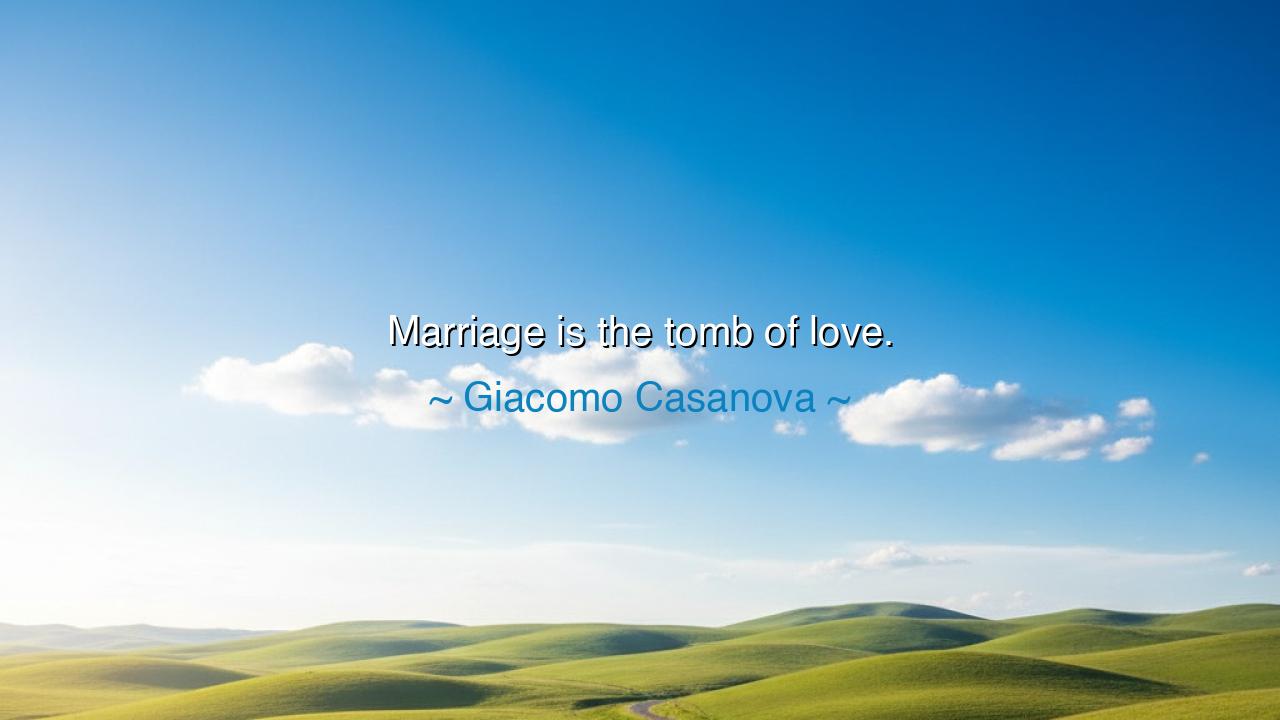
Marriage is the tomb of love.






When Giacomo Casanova declared, “Marriage is the tomb of love,” he clothed his words in both irony and sorrow, a lament rising from a man who knew passion well but distrusted its binding. His statement is not merely a jest against matrimony, but a cry from one who believed that love, in its wild and untamed form, withers when confined within the rigid structures of marriage. To call marriage a tomb is to suggest that what once lived with fire and freedom dies when sealed within walls of duty, custom, and permanence.
The meaning of this quote lies in its portrayal of the tension between passion and stability. Casanova, the great lover and adventurer of 18th-century Europe, saw love as a fleeting fire, a force of desire and delight that thrives on novelty, secrecy, and risk. In his eyes, the vows of marriage transform that living flame into ash, turning lovers into prisoners of routine and obligation. What was once intoxicating becomes ordinary, and what was once sacred becomes burden. Thus, to him, marriage is not the flowering of love, but its grave.
The origin of his words is rooted in Casanova’s own life. Known for his countless affairs and restless pursuit of pleasure, he resisted marriage precisely because he feared it would destroy the passion he so treasured. In an age where marriage was often less about romance and more about property, inheritance, and family alliances, Casanova’s cynicism was sharpened. For him, marriage was not a celebration of love but its undoing, a contract that smothered the very spark it pretended to protect.
History offers examples that echo Casanova’s warning. Consider the tragic story of Héloïse and Abelard in medieval France. Their love burned with brilliance—letters filled with longing and philosophy that survive even now. Yet when duty and social pressures forced them into the mold of marriage, their passion was crushed by scandal, separation, and despair. Their romance, immortalized in writing, outlived their union, proving Casanova’s dark claim: that marriage, in their case, became the end of love rather than its fulfillment.
Yet Casanova’s words, though biting, are not the only truth. For while he saw marriage as the tomb of love, others have found it to be its rebirth. Some lovers have discovered that passion need not die within commitment but can transform into something deeper—less fire, more light; less frenzy, more enduring warmth. The ancients often taught that passion is fleeting but devotion can be eternal. Thus, his words are a warning, not a final verdict, urging us to guard against letting the routines of marriage suffocate the living breath of love.
The lesson here is clear: do not let duty alone govern your union, lest love perish beneath its weight. Cherish passion, nurture intimacy, and guard against complacency. If marriage becomes mere routine, Casanova’s words come true, and love lies buried. But if marriage is entered with reverence and renewed each day with effort and tenderness, then it may not be a tomb, but a sanctuary where love grows wiser and stronger.
What then must the listener do? If you marry, do so not as one who buries love, but as one who tends it. Keep alive the flame of affection through acts of kindness, through honesty, through play and delight. Remember that love is not preserved by vows alone, but by constant attention. Refuse to let familiarity breed neglect. Choose daily to awaken love anew, lest it sink into silence.
Remember always: marriage may be the tomb of love, if neglected—but it can also be its temple, if tended with care. Casanova’s warning is a mirror: it shows us what love becomes when we abandon it to routine. Yet in that mirror lies a challenge—to rise above cynicism, and to prove by our lives that love can endure, not as a delusion, but as a living, breathing flame sheltered by the covenant of two hearts.






AAdministratorAdministrator
Welcome, honored guests. Please leave a comment, we will respond soon